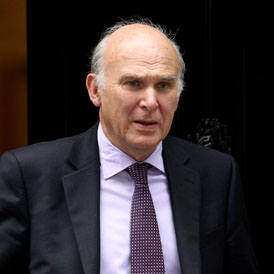PCC condemns newspaper over Vince Cable tapes
The Daily Telegraph has been criticised by the Press Complaints Commission for sending undercover reporters posing as constituents to secretly tape ministers, namely Vince Cable.

The PCC said that the newspaper breached rules against the use of “subterfuge” by sending undercover reporters to try to expose alleged discontent among Liberal Democrat ministers.
Business Secretary Vince Cable was stripped of media regulation powers after boasting to journalists posing as constituents at a surgery that he had “declared war” on Rupert Murdoch.
But the PCC ruled that the newspaper launched the “disproportionately intrusive attention” without sufficient reasons and upheld a complaint made by Lib Dem President Tim Farron.
And it said it would issue fresh guidance over the acceptable use of subterfuge in the wake of the successful complaint about the so-called “fishing expedition”.
The media watchdog did however accept that the paper’s decision to secretly tape senior politicians had produced material that was “in the public interest”.
Mr Cable caused a political storm when he told undercover reporters from the newspaper that being in coalition was “like fighting a war” and that he could use the “nuclear option” of resigning.
He was subsequently barred from ruling on the proposed takeover of BSkyB by Mr Murdoch’s News Corporation and lost all such media regulatory powers to Culture Secretary Jeremy Hunt.
Around 200 people contacted the PCC after the stories were published in December, and Commons Leader Sir George Young led complaints that the undercover methods undermined democracy.
Defending its tactics, the Daily Telegraph told the PCC the operation had proved that Lib Dem ministers – as it had been informed by unnamed senior Conservative sources – “were not consistent in their private and public statements” about the coalition.
PCC Director Stephen Abell said: “The Commission has consistently ruled that ‘fishing expeditions’ where newspapers employ subterfuge and use clandestine devices without sufficient justification are unacceptable.
“The issue of how journalists make use of subterfuge deserves scrutiny, and indeed goes much wider than the Telegraph’s actions on this occasion.
“The PCC takes this subject seriously and will issue further guidance on this area with a view to ensuring high standards across the industry.”
Clause 10 of the Editors’ Code of Practice bars the obtaining or publishing of material “acquired by using hidden cameras or clandestine listening devices”.
Engaging in misrepresentation or subterfuge “can generally be justified only in the public interest and then only when the material cannot be obtained by other means,” it states.
Mr Farron said: “I am pleased that the PCC has upheld our complaint and defended the vital principle that MPs of all parties should be able to talk freely to their constituents in their constituency surgeries.
“I have always conducted my surgeries in the open and frank manner that everyone should expect.
“That was not affected by the Telegraph’s sting operation. I do not request ID, I do not require birth certificates, and nor should any MP have to.
“Everyone should be able to go an MP’s office and expect that the meeting will be in confidence, open and honest.
“The secret recordings threatened to undermine that relationship, and I am glad that the PCC has supported that view.”
-
Latest news
-
‘Government responsiveness should be improved’ says infected blood inquiry chair4m

-
Infected Blood scandal: How UK failed on a global scale4m

-
‘There’s a strong evidential basis’ for ICC to grant arrest warrants for Netanyahu, says criminal law expert4m

-
International Criminal Court prosecutor seeks arrest warrants for Israel PM and Hamas leaders3m

-
‘Highly unlikely there was foul play’ in Iran president helicopter crash, says Tehran professor5m

-




